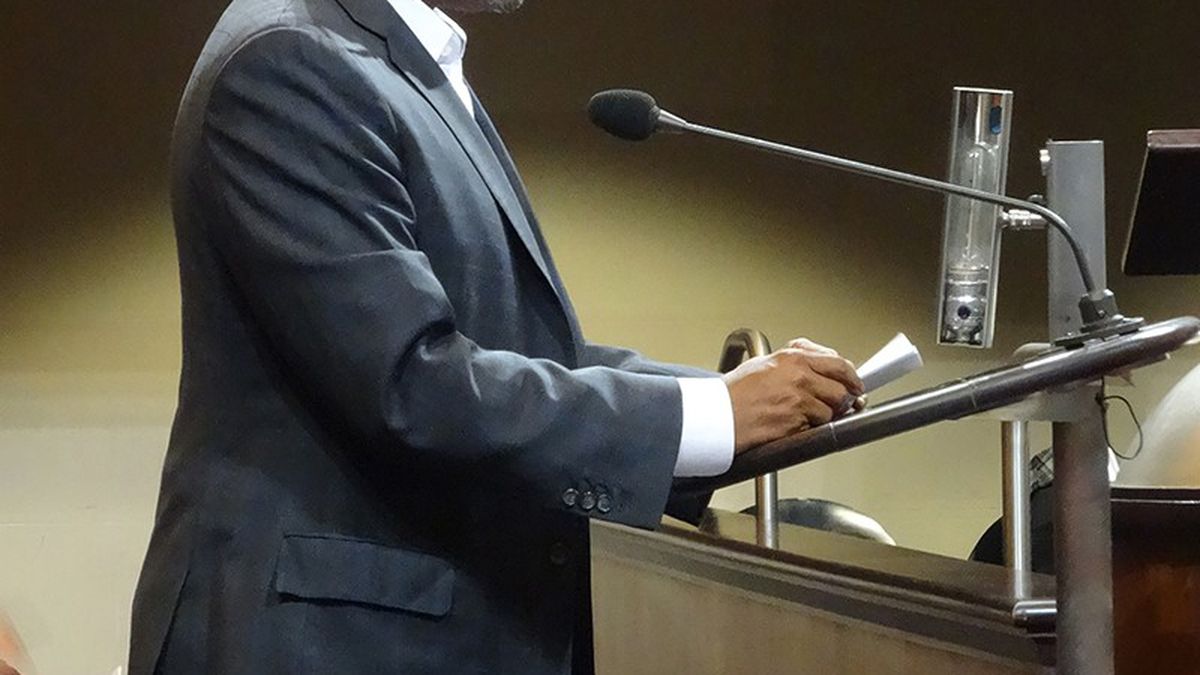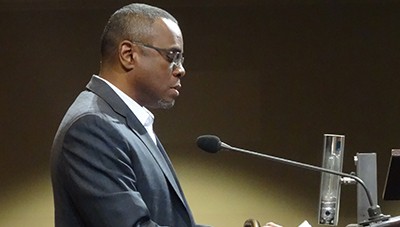It’s not unusual for public meetings at Oakland City Hall to draw large numbers of activists when the topic involves a battle between market-rate and affordable housing. But last week’s planning commission meeting took a surprising turn when a group of non-English-speaking Asian-immigrant seniors showed up to support the construction of a 24-story luxury apartment tower on East 12th Street, between 1st and 2nd avenues, near Lake Merritt — a development that is designed to accommodate wealthy residents.
The group of seniors held placards with a message that read, “We Support! The Residential Project @ East 12th St. & 2nd Avenue,” over an image of the proposed luxury tower.
As the night unfolded, it became clear that the immigrant seniors, who live in the Eastlake neighborhood near the proposed tower, had been misled. They thought the tower was to be an affordable housing development that they would be eligible to live in. The deceptive Astroturf effort was exposed by several bilingual Cantonese and Vietnamese speakers who talked to the group of seniors. In addition, the Express learned that UrbanCore, LLC, the developer of the luxury tower, had paid to have the immigrants bused to the meeting and had given them the placards supporting the project.
Oakland resident Anh Nguyen, who said she didn’t intend to take a position on the Lake Merritt tower at the planning commission, ended up speaking to the commissioners during the public comment period after learning that many of the elderly Asian Americans had been given false information. “When I showed up to the meeting, I was surprised. I didn’t expect to see my people there, my people who didn’t speak English,” said Nguyen, who speaks both Vietnamese and English, in an interview. “So I started asking them why they were there.”
Nguyen told me that the elders told a consistent story: They were told to come to the planning commission meeting by Lynn Truong, the owner of the Sun Hop Fat 1 market located at 501 East 12th Street, three blocks east of the city-owned land where UrbanCore wants to build the 298-unit market-rate apartment tower. Others verified that Truong brought the group, and that many of them are her employees.
“I saw a whole group of them standing together, so I asked them all, ‘do you know why you’re here?’ They said it was for affordable housing,” Nguyen said. According to Nguyen, many of the elders had been told that UrbanCore’s proposed tower would include affordable senior housing, and that they could apply for a spot in the building. “At that point, I started asking others in their group the same questions, because it occurred to me that someone had lied to them,” said Nguyen.
“I had a number of conversations with several folks throughout the night,” said Timmy Lu, the civic engagement coordinator with the Asian Pacific Environmental Network (APEN), in an interview. Lu attended the meeting to oppose the current plans to use the city-owned parcel for purely market-rate housing. Lu, who speaks both Cantonese and English, said many of the seniors who were brought there to support the tower project were Chinese Vietnamese, an ethnic group that includes Chinese inhabitants of Vietnam who often speak both Cantonese and Vietnamese. In the 1980s, Oakland became the home of many Chinese Vietnamese immigrants, and many of these people moved to the Eastlake neighborhood. Lu said the group at the planning commission meeting also included some ethnic Vietnamese elders, and at least one Burmese-language speaker.
“The first groups I talked to were all completely surprised the project included no affordable housing, and one of the women … she actually thought she was here to apply for affordable housing,” said Lu. “I asked her, ‘Who told you to come here?’ and she said it was Ms. Lynn of Sun Hop Fat market.”
During the meeting, Lu and Nguyen talked to a group of the elderly Chinese-Vietnamese immigrants, and tried to clarify for them that the UrbanCore project will not include affordable housing. “At a certain point, Ms. Lynn, the owner of the Sun Hop Fat market, she pulled aside some Cantonese speakers and told them in Cantonese, not to listen to Anh [Nguyen], saying that she’s from San Francisco, and she’s trying to influence this project to let people from San Francisco take these homes, not people from Oakland,” said Lu. “She even used a curse word to refer to Anh.”
“I’ve seen my parents go through this stuff,” said Nguyen, whose family emigrated from Vietnam to Massachusetts in 1975. “I’ve seen my parents being used, and not understanding what’s being said to them. It’s not uncommon — because our elders are monolingual — that they fall into some kind of trickery.”
“This is what developers often do, in particular to the monolingual Asian community,” added Nguyen. “Chinatowns, Little Saigons, these communities are often in locations coveted for development.”
Nguyen and Lu both told planning commissioners that they believed the Asian elders who were brought there by UrbanCore and Truong had been misled. Because the planning commission meeting had no translators, Lu chose to say in Cantonese that “the development is not going to include affordable housing.”
When approached during the planning commission meeting, the woman that the seniors identified as Lynn Truong refused to respond to the allegations that she misled the group of seniors. She also did not respond to my requests for a follow-up phone or email interview. Michael Johnson, CEO of UrbanCore, told me during the meeting that Nguyen’s comments to the planning commissioners were a lie. In a subsequent email to the Express Johnson said there must have been a misunderstanding. “We have never misled anyone that this project was anything other than a market rate project,” wrote Johnson. “Our social media, petition, and project information sheet that was distributed all referenced a market-rate project. I am sorry if any of the Asian residents did not fully understand this.”
According to the driver of a bus that was parked outside City Hall during the planning commission meeting, the bus had carried many of the Asian elders to the meeting and had been rented by UrbanCore’s Johnson.
“We did provide transportation for them to attend the meeting,” Johnson acknowledged in his email to the Express. “This was as a courtesy to help them get to the meeting as I understand they were supporting our project because of the economic benefits it would bring to this community.”
While Johnson’s project would not provide affordable housing for immigrant seniors, it could greatly benefit Lynn Truong and her husband Tony Tieu. Public records show the couple owns approximately $10 million in Oakland real estate, and most of their holdings are located within just a few blocks of tower — and thus the value of their property could increase substantially if the luxury project is built. According to records from the Alameda County Assessor, Truong and Tieu own a two-story house that has been converted into an apartment building at 1429 2nd Avenue and has an assessed value of $450,000. The building is just one and a half blocks from UrbanCore’s site. The couple also owns a two-story apartment house at 410 International Boulevard, three blocks from UrbanCore’s site, with an assessed value of $217,937. And three blocks east on 12th Street, Truong and Tieu own most of the block bounded by 5th and 6th avenues and 11th Street, including four apartment buildings, a warehouse, the Sun Hop Fat 1 market building, and an adjacent parking lot, collectively assessed at $4,495,012.
After some discussion, the planning commission approved UrbanCore’s project. The city council must now vote on whether to approve the sale of the land to UrbanCore for the project to move forward. The expected sale price is expected to be approximately $5.1 million.
Jahmese Myers was the only commissioner to vote against the tower’s approval. In her public comments before the vote, Myers said she is concerned about the lack of opportunities for Black-owned real estate developers and builders in Oakland’s real estate markets. “As a Black member of this community I want opportunities for Black members of this community, including good paying jobs,” said Myers. “But my biggest concern,” she said, “is the rapid rate at which we’re displacing Black residents.” Adding that she supports building market rate housing in Oakland, Myers said the city’s ability to build affordable housing has been seriously constrained and that Oakland shouldn’t be selling the few city-controlled parcels it has to build luxury housing. “I don’t think there’s any more suitable site than this site for afford housing,” said Myers just before casting a no vote.
In an interview, Myers said she was disappointed in the process that led to approval of the Lake Merritt tower, and that the city must do a much better job ensuring that particularly vulnerable groups can understand and participate in public meetings. “For public hearings on specific plans, or large or controversial development projects, the city should always anticipate and provide translation services,” she said. “This is especially important given Oakland’s large population of non-English speaking communities who will be impacted.”
In reference to the Asian seniors who were misled into thinking that the tower would include affordable housing and were bused by the developer to the planning commission meeting to support it, Meyers said: “I didn’t think Oakland is the place where this type of potential manipulation would take place, or where we treat communities like this,” said Myers. “Actually, I’m shocked and I hope that APEN can continue to follow up with these community members to let them know what project is actually about.”
Councilmember Abel Guillen, whose district includes Eastlake, said the city needs to do more to ensure full access to city meetings for all residents. “The City of Oakland has the equal access ordinance, but it needs more teeth,” said Guillen. “We need to make sure all public services have translation services on demand, so that when citizens show up we’re ready to hear their concerns.”













